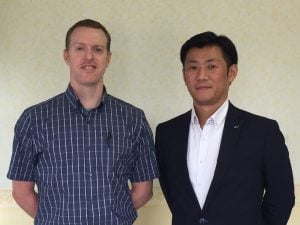
Giving job seekers a look behind the scenes, JobsinJapan.com is conducting interviews with various employers giving you a better understanding of the working environment inside of the company, what qualifications it takes to succeed there, and what kinds of career opportunities might await.
This week, we speak with Mr. Kevin Salthouse, Director at Link Interac Inc. which is Japan’s largest private provider of English teachers to the public school system.
Q: First off, a little history about Interac, if you please?
A: Interac was founded in 1972, so we’ve been in business for over 40 years. Initially, the company specialized in business English classes for corporations. In the 1990s, we began to expand into the ALT (Assistant Language Teacher) business, which involves posting teachers in various regions throughout Japan.
Q: Over the last four decades, how has the company grown?
A: Interac is owned by a Japanese company, Link and Motivation, Inc., currently operates 15 branches, and employs about 2,600 ALTs stationed across the country from Hokkaido to Kyushu.
Q: What is the ratio of native English speakers to non-native English speakers at the company in teaching jobs?
A: All Interac Group instructors must be competent to a native-level. ALT nationalties bread down as follows: 47% North American, 18% Asian, 16% UK, 8% from Australasian, 4% Caribbean and 7% from other regions.
Q: How about gender and age? Any preferences?
A: There is no age or gender preference, but there are more males than females, in line with the applications we receive. Most of our teachers are in their mid-20s to mid-30s but there are many who are older than this as well.
Q: What kinds of qualifications do you look for in applicants?
A: Interac can train people how to teach, so key for us finding applicants who are energetic and sincerely interested in working with children. ALTs need to be bright, cheerful, enthusiastic, and flexible. They also need to be able to fit into a Japanese school environment and have a sense of responsibility.
The ability to acclimate to Japanese life, especially in some of the more rural parts of the country, cannot be taken lightly. So we also ask, “Does this person have the adaptability, and flexibility to be able to fit in?”
Also, unless the applicant already has a visa status that allows them to live or work in Japan (like a spouse or a permanent resident visa), they need to be ready to change their status to “Instructor” (as is required by Japanese law to work in public schools). We, of course, sponsor visas for our employees coming from overseas. Regardless, part of getting an instructor visa is proving that they have had at least a 12 years full education where the language of instruction was English. For some people this may mean getting certified documents from overseas, which can take time.
Q: What about credentials?
A: We welcome people with educational degrees, teaching credentials, etc., but they are not essential. Fundamentally, it comes down to personality and if the person is a good match for this kind of work. Having studied a second language is certainly a benefit, as it enables a person to understand the learner’s perspective here in Japan.
Q: What is the average contract length?
A: Contracts are typically for a year, starting in April. Re-contracting for subsequent years is possible. There are part-time positions available, but mainly in the Kanto area.
Q: What types of institutions do you cater to?
A : Elementary schools, junior high schools, and high schools.
Q: What is the turnover rate?
A: Committing to the full term of the contract is important in the education industry but obviously there are instances when individuals need to return home or make a life-change. Nationwide this will happen to a few people each month, which, considering Interac’s size, is very good.
Q: Is there a training period?
A: There is a week of initial training to give teachers a core foundation, so they can make a good impression from the beginning, and then build on that. There is ongoing training support through the year. We work very hard to support people. Our ALTs are spread all over Japan, many in rural areas, but each ALT belongs to an area where he or she can receive management support and training.
We also have a program dedicated to helping our current employees gain insight into how they work and give them the tools to improve their professional skills. We call this program the Careen Navigation Program and it will be a cornerstone to helping people get the most out of their time with us. We are adding units to the program every few months. We are pretty proud of this as it adds value to both the employee and the company by systematizing and promoting a program to help our ALTs improve outside of the classroom as well as on-the-job.
Q: What is the typical work day like?
A: Teachers arrive between 8:00 and 8:30am at their host school, Monday-Friday, They will have three to six periods of instruction and time allotted to lesson preparation. Any extracurricular interaction – such as eating lunch together and participation in after-school activities, etc. is scheduled alongside other classes. We encourage our ALTs to actively take part. Being an ALT is usually a steady daytime job, and weekends and national holidays are usually off.
Q: What kinds of responsibilities do your teachers have?
A: Usually they are paired with the class’s usual Japanese instructor. But it is not necessarily a ‘team teaching’ arrangement position per se. Quite often, the ALT will be allotted a certain amount of time in the classroom that is theirs to use independently. It is more rewarding for the students because they get more direct exposure to a native English speaker and it also more rewarding for the ALT since they are able to exercise more control over the classroom.
Q: How about outside the classroom?
A: It’s important for teachers to understand the responsibility they have in front of children, because especially at early formative years, children are much more impressionable. In Japan you are a ‘sensei,’ which carries a lot of unseen responsibility, both in the school and in the community at large.
Q: What’s the most attractive thing about teaching English at Interac, do you think?
A: The English teaching job in itself is very rewarding because you deal with children and you can see them grow, so on a personal level that’s very rewarding. At the same time the work/life balance is also rewarding.
Q: What are the benefits of working at Interac versus its competitors?
A: The salary range may not be as attractive as, say, some English conversation positions, but the benefits come from elsewhere. We pride ourselves on providing a very good work/life balance, career navigation support, and a good knowledge base, so ALTs can develop. Our ALTs also have the chance to become part of the school community and build meaningful relationships with the company, their coworkers and students.
Q: What kinds of other career opportunities are available at Interac?
A: There are recruiting positions, training positions, HR manager positions, etc. and it is possible to build a longer-term career with us.
Q: Tell us about your personal experience with Interac.
A: I originally came to Japan in 1992, hired by Interac from the UK, and have remained with the firm. I came to Japan with the idea of gaining some kind of overseas experience. At that time, there were large Japanese investments in the UK,. I thought it would be useful to get to know the Japanese culture a bit more and to understand how Japanese business operated. I had no teaching experience, but I was based in Hiroshima, a lovely city, and came to love the job. I spent seven years there, and then took advantage of an opportunity to come to Tokyo to work in management.
Q: Such a long term at one English teaching company is a bit unusual, no?
A: Actually it is increasingly rare in any company or industry to stay for such a long time at one firm, even for Japanese people. However Interac has provided me – and others – with the opportunity for a fulfilling career. Interac has a strong core philosophy, and I enjoy the people. It is staffed by genuine, motivated individuals.
Q: Any advice for people coming to Japan wanting to teach English here?
A: Keep an open mind and expect the unexpected. Be aware that you will be part of a community that may have different expectations of you because you are a teacher and are in a position of responsibility and trust. Working in Japan can be a valuable and life-changing experience and we would love to receive an application from anyone with the drive, ambition and flexibility to work with us here in Japan.
Interested in working at Link Intearc, Inc. Current Openings

















